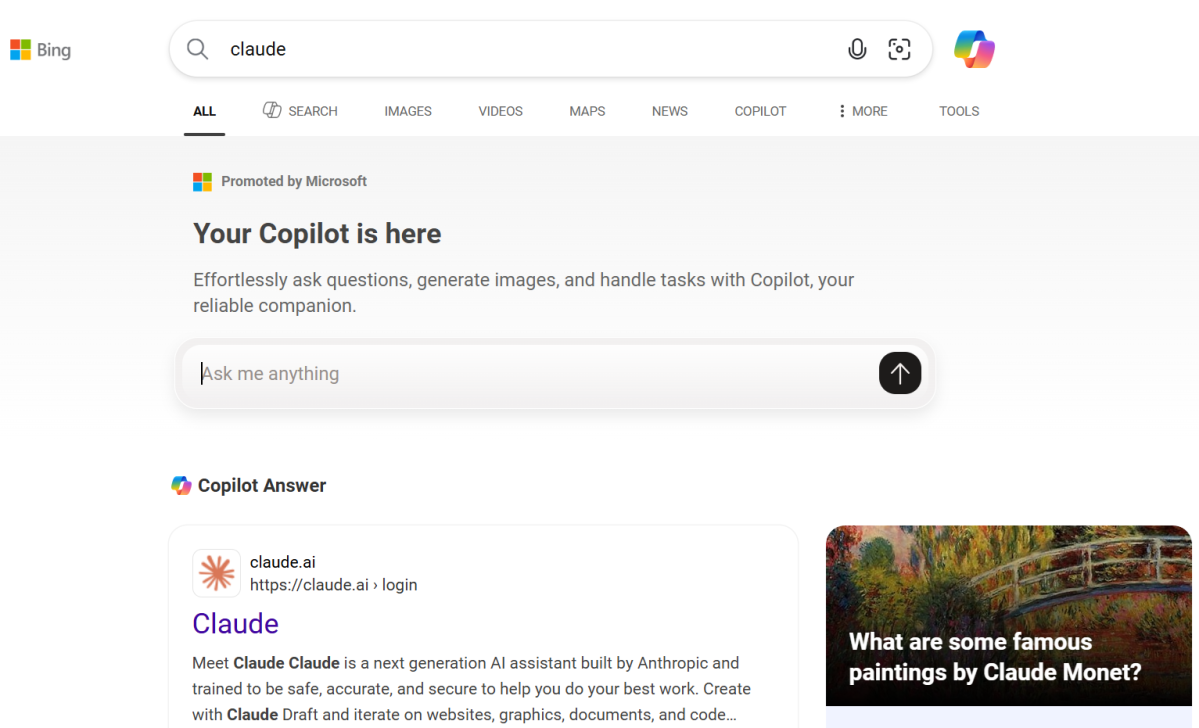- Регистрация
- 17 Февраль 2018
- Сообщения
- 38 925
- Лучшие ответы
- 0
- Реакции
- 0
- Баллы
- 2 093
Offline
Microsoft's pleas and ads for you to use its services have now migrated to AI and its Copilot tools.

Image: Pixaby
Stop us if you’ve heard this before: Microsoft encourages you not to visit its competition. The latest category? AI.
You may have noticed that if you visit Bing.com and then search for Google, Microsoft might remind you that it too has a search engine. More recently, Microsoft is now encouraging you to remain within its ecosystem and use Copilot instead of venturing elsewhere to Google, OpenAI, or Meta.
When searching for “Claude” within Microsoft Edge — I use Edge with Bing set at its search engine — I tried looking up “Claude,” the AI tool developed by Anthropic. While Bing dutifully returned the link as well as related information, it also reminded me that “Your Copilot is here,” accompanied with a Copilot-specific search box.
Windows Latest found that those banners are injected by Bing.com, rather than Edge itself.

Mark Hachman / Foundry
At this point, I basically expect Microsoft to virtually shout, Wait, wait, don’t go! before I wander off its digital property.
We can see evidence that, collectively, Microsoft’s tactics are working. Last week, Microsoft reported results for its fiscal fourth quarter. Those results included a 21 percent boost in search and news advertising revenue excluding traffic acquisition costs, which is a substantial increase from last year. Microsoft doesn’t really break out how that number into various growth drivers, but we can assume that every little bit counts: ads within Copilot, search ads themselves, widgets, and more.
It’s also worth remembering that while OpenAI’s ChatGPT is crushing the competition in terms of user session traffic, Copilot made a surprising surge into second place around May. While that may be due to some inconsistencies in the tracking numbers, it’s also possible that Microsoft’s integration of Copilot into Windows plus various tactics to try and keep them there — like this! — are paying off.
It’s just hard to say whether Microsoft’s fooling people into using it, however, or convincing them to stay.
Author: Mark Hachman, Senior Editor, PCWorld

Mark has written for PCWorld for the last decade, with 30 years of experience covering technology. He has authored over 3,500 articles for PCWorld alone, covering PC microprocessors, peripherals, and Microsoft Windows, among other topics. Mark has written for publications including PC Magazine, Byte, eWEEK, Popular Science and Electronic Buyers' News, where he shared a Jesse H. Neal Award for breaking news. He recently handed over a collection of several dozen Thunderbolt docks and USB-C hubs because his office simply has no more room.
Recent stories by Mark Hachman:

Image: Pixaby
Stop us if you’ve heard this before: Microsoft encourages you not to visit its competition. The latest category? AI.
You may have noticed that if you visit Bing.com and then search for Google, Microsoft might remind you that it too has a search engine. More recently, Microsoft is now encouraging you to remain within its ecosystem and use Copilot instead of venturing elsewhere to Google, OpenAI, or Meta.
When searching for “Claude” within Microsoft Edge — I use Edge with Bing set at its search engine — I tried looking up “Claude,” the AI tool developed by Anthropic. While Bing dutifully returned the link as well as related information, it also reminded me that “Your Copilot is here,” accompanied with a Copilot-specific search box.
Windows Latest found that those banners are injected by Bing.com, rather than Edge itself.

Mark Hachman / Foundry
At this point, I basically expect Microsoft to virtually shout, Wait, wait, don’t go! before I wander off its digital property.
We can see evidence that, collectively, Microsoft’s tactics are working. Last week, Microsoft reported results for its fiscal fourth quarter. Those results included a 21 percent boost in search and news advertising revenue excluding traffic acquisition costs, which is a substantial increase from last year. Microsoft doesn’t really break out how that number into various growth drivers, but we can assume that every little bit counts: ads within Copilot, search ads themselves, widgets, and more.
It’s also worth remembering that while OpenAI’s ChatGPT is crushing the competition in terms of user session traffic, Copilot made a surprising surge into second place around May. While that may be due to some inconsistencies in the tracking numbers, it’s also possible that Microsoft’s integration of Copilot into Windows plus various tactics to try and keep them there — like this! — are paying off.
It’s just hard to say whether Microsoft’s fooling people into using it, however, or convincing them to stay.
Author: Mark Hachman, Senior Editor, PCWorld

Mark has written for PCWorld for the last decade, with 30 years of experience covering technology. He has authored over 3,500 articles for PCWorld alone, covering PC microprocessors, peripherals, and Microsoft Windows, among other topics. Mark has written for publications including PC Magazine, Byte, eWEEK, Popular Science and Electronic Buyers' News, where he shared a Jesse H. Neal Award for breaking news. He recently handed over a collection of several dozen Thunderbolt docks and USB-C hubs because his office simply has no more room.
Recent stories by Mark Hachman:
